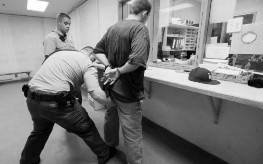<< LAST Contents NEXT >>
What Could Happen When You Are Arrested?

4th step: Transport
3rd step is on Page 42 – Warning, Arrest and Holding Area
- Often those who are arrested will be taken to transportation vehicles.
- Sometime you are asked to walk a short distance as a group to the police processing area.
- Resistance of any kind during these steps is symbolic at best and will cost you more than you want to pay.
5th step: Processing and Booking
- Most people who are arrested are placed in a holding area or asked to remain on a transport bus waiting to be booked.
- Don’t expect meals, drinks, phone calls, or bathrooms. Sometimes there are pay phones, so you may want to bring quarters, or your phone card #, and a contact phone #.
- Typically you will be photographed, fingerprinted, asked to empty pockets and turn over property, and asked for info.
- You are only required to give name, address, and 10. Usually Social
- Security number is requested. It is essential to bring a current, government issued 10 for identification.
6th step: Action on your Case
The case may be resolved soon after processing.
- Or you may be released after being given a summons or ticket with the charges and court date for later resolution of the case.
- Or you may need to be arraigned.
- If you wait in jail it will usually take 24-48 hours after being charged.
- Or you can post bond to get out of jail more quickly but you may be required to return for arraignment several weeks even months later. Choice: To wait, or to post bond and get out of jail more rapidly.
Further Explanation of Arraignment
- Appear before a judge and answer to the charges.
- Within 24-48 hours after arrest a defendant who remains in custody will be brought into court for an arraignment.
- If you post bond, you may be required to return for arraignment several weeks later.
- At arraignment the defendant is read his/her rights and is informed of the charges.
- At arraignment, each person (now called a defendant) will be asked how s/he pleads to the charges.
- You can make one of several pleas, as shown below: You can request that charges be dropped, or dismissed.
- Note: You don’t need a lawyer for this and can represent yourself. But it is generally helpful to have counsel of your own choosing to guide you through the process. Soulforce will have a legal representative available for the group. That person will have negotiated, in advance, about possible charges. There should be few, if any, surprises.

